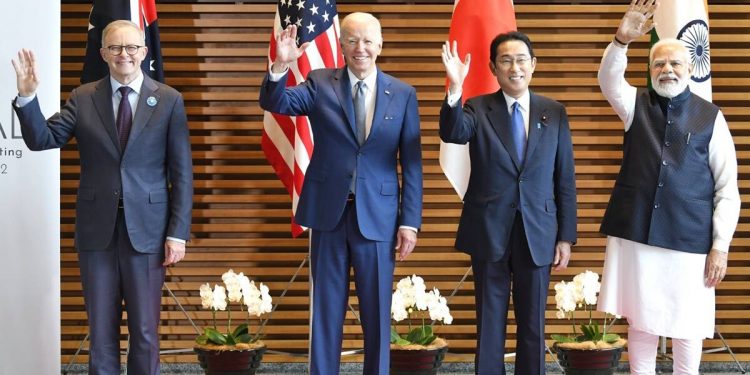US President Joe Biden set the tone and tenor of the Quad summit meeting in Tokyo 24 May a day before the top leaders of the four countries of the grouping– US, Japan, Australia and India – could meet. In an apparent change of position on the US’ stance over open China-Taiwan conflict, Biden announced the US would intervene militarily should China invade the island country the way Russia has invaded Ukraine. He deliberately drew the parallel to send the message across to China that it would be a mistake for the latter if it gets encouraged by Russian invasion and tries to take over Taiwan by force. The US President warned China not to “flirt with Taiwan” and China countered him by asking the US “not to play with fire.”
The host of the summit, Prime Minister of Japan Fumio Kishida said what remained unstated by Biden. He said, “Attempts to change the status quo by force, like Russia’s aggression against Ukraine, should never be tolerated in the Indo-Pacific, above all, in East Asia.”
He even spelt out the rationale of the Quad grouping by asserting that with the regional security environment becoming “increasingly severe,” he concurred with President Biden that they need to speedily strengthen the deterrence and response of the alliance. The American official position on Taiwan is that it has never recognised Beijing’s claim to the self-governing island of 23 million. The US provides Taiwan defensive weapons, but had, till Biden’s statement, remained intentionally ambiguous on whether it would intervene militarily in the event of a Chinese attack. Biden has, during the past few months, iterated that the US was “committed” to militarily defending Taiwan. But, no sooner had he said so, the US administration rushed to walk back the President’s words and insisted there had been no change in the American position on providing support to Taiwan by way of supplying military hardware. But, this time Biden’s categorical statement that the US would defend Taiwan has ruffled China’s feathers as the assertion is made on its doorstep. It is not difficult to understand Biden’s belligerence towards China, apparently reversing America’s China-Taiwan policy. His administration has drawn flak from his own countrymen following the hurried pullout from Afghanistan, leaving the population, especially Afghan women, at the mercy of the Taliban with a medieval mindset.
Read Also – China, Russia warplanes conduct ‘air patrols’ over the Sea of Japan as Quad leaders met in Tokyo
His ratings as President among the American public has gone down quite alarmingly. Close on the heels of the Afghan crisis came Russia’s invasion of Ukraine. There too, the US and the West cut a rather sorry figure as Russian President Vladimir Putin pulverised parts of Ukraine and NATO watched the mayhem like a mute spectator. In time however, more international sanctions and military assistance in the way of equipment and other hardware was extended to Ukraine. Added to that, the spirited resistance by the people of Ukraine has greatly checked Russian forces as the war enters its third month. This could have given confidence to Biden to take on China through a sort of diplomatic sabre-rattling to salvage some of his lost position. This is why he deviated for the fourth time in the recent past from America’s official position vis-a-vis China-Taiwan confrontation. He lapped up the opportunity when a reporter asked him in Tokyo whether he was willing to get involved militarily to defend Taiwan if it came to that especially since the US under him did not want to get involved in the Ukraine conflict militarily “for obvious reasons.” He nodded and asserted, “Yes. That is the commitment we made.”
Doing a fine balancing act and diplomatic wordplay, he said the US has agreed with the “One China” policy and signed several agreements on it, but the idea that China can take Taiwan by force is “just not appropriate.” Within hours, China expressed its “strong dissatisfaction and firm opposition” to Biden’s comments, saying it will not allow any external force to interfere in its “internal affairs.” Wang Wenbin, a spokesman for the Chinese Foreign Ministry, sought to warn the US by reminding the latter that on the issues concerning China’s “sovereignty and territorial integrity and other core interests” there is no room for compromise. China urged America not to deviate from the “One China” policy and cautioned it against using indiscreet words and sending “any wrong signal to pro-Taiwan independence and separatist forces.” The spokesperson also asked the US not to cause “serious damage to the situation across the Taiwan Strait and China-US relations.”
What has happened is a sort of ping-pong game between Biden’s US and Xi Jinping’s China. Biden has apparently sought to assure the Quad allies that America is ready to play hard ball against China at least in words. Xi’s officials, in turn, wasted no time to tell the world China would not be cowed down by the US. One positive element of this engagement is that China has been told, in no uncertain terms, that it must think twice before following in Putin’s footsteps. If China heeds it, which is in the realm of possibility, Biden will score brownie points in US domestic politics.






































